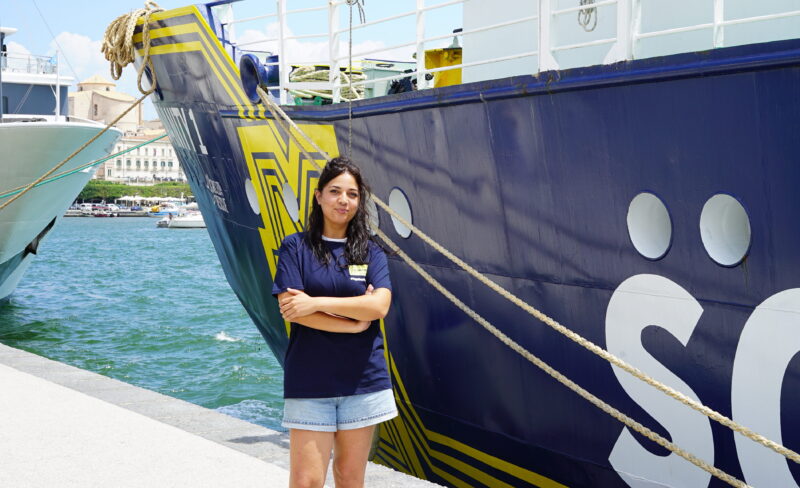Interview: Logistician for a SAR vessel

Around 30 people are on board Humanity 1 during our rescue missions, but for our ship to be able to embark on week-long rotations at sea, it needs extensive preparation on land. Logisticians ensure that the crew is supplied with everything they need for a successful rotation – from food and spare parts to medical equipment.
Please introduce yourself and what you do for work for SOS Humanity.
My name is Federica, and I am one of the logisticians of Humanity 1, together with my colleague Gabriella.
Our work is mainly focused on the operational aspects of the ship, namely getting it ready for rescue operations; this translates to making sure the galley is fully stocked with high quality food, that the Care Team is ready to welcome survivors on board with rescue kits, warm blankets and personal hygiene products, we supply the SAR department with all the necessary equipment, including spare parts for maintenance of the RHIBs and that the Comms Team has the IT and visual tools needed for their operations.
In addition, we try to make every donation count. We work very closely with the financial and fundraising departments by giving monthly expense reports, and carrying out market and supplier analysis to find the best offer in terms of quality and price. We try to source from local suppliers whenever possible to help support the local economy. We’re also in regular contact with port authorities to make sure operations run smoothly and that everything is in line with regulations.
How and when did you start working in this position for SOS Humanity?
I started following the operations of Humanity 1 in November 2022, during a very sad and challenging period: the selective disembarkation in Catania. I went there to support the survivors and the organisation, also because some friends I had met during other volunteering experiences were on board. Then I met the ship and the crew again in April 2023, when the vessel had its first port call in Siracusa. At that moment, due to a last-minute cancellation, I joined Rotation 5 volunteering as a second cook.
After building a strong relationship with the organization, the ship, the crew, and with my colleague Gabriella, who was the only logistician back then, I officially started working with SOS Humanity in February 2024, which so far is one of the best memories I have!
As part of your work, you are in contact with people from Siracuse. What opinions on the Search and Rescue (SAR) ships do you hear? How do people react to SOS Humanity?
In my experience, people from Siracuse are generally very open and welcoming towards us and what we do. We see this through the collaboration with local associations working in reception and human rights, along with the support of individual citizens who deeply care about what is happening in the Mediterranean. Over time, thanks to local events like public talks, photo exhibitions, and community gatherings, we’ve been lucky to build a connection with the local community, not only with those who have always supported us, but also with people who maybe felt distant or didn’t know much about search and rescue.
I vividly remember a moment of our Open Ship event last September: We were giving tours for visitors on board guiding them through the ship to areas where survivors are welcomed and were they spend time. Many of them were visibly moved, and some, with tears in their eyes, thanked us for our work in the Central Mediterranean. Of course, we are also aware that not everyone sees us in a positive way, mostly because of how NGO ships are sometimes represented in the media.
Has your opinion on Search and Rescue changed ever since you started working with SOS Humanity?
Absolutely. Being involved only made me realise how necessary the presence of the civil fleet is in the Central Mediterranean, not only because people need to be saved, but because safe routes need to be accessible to everyone. I can really see the amount of work, coordination, funding, and human effort needed to make sure that people forced to flee unbearable conditions can have access not only to a better life, but even to basic rights like safety, care, and dignity. It is not just about saving lives, it’s about making sure people have the chance to be safe and heard.
What motivates you to keep working in a search and rescue organisation during this political climate?
It is the fact that the need to act hasn’t gone away, but it’s actually growing. People are still risking their lives at sea because safe and legal alternatives are being denied to them.





